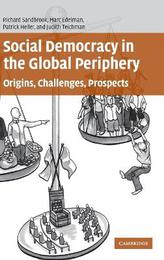
|
Social Democracy in the Global Periphery: Origins, Challenges, Prospects
Hardback
Main Details
| Title |
Social Democracy in the Global Periphery: Origins, Challenges, Prospects
|
| Authors and Contributors |
By (author) Richard Sandbrook
|
|
By (author) Marc Edelman
|
|
By (author) Patrick Heller
|
|
By (author) Judith Teichman
|
| Physical Properties |
| Format:Hardback | | Pages:300 | | Dimensions(mm): Height 234,Width 159 |
|
| ISBN/Barcode |
9780521867030
|
| Classifications | Dewey:320.5315 320.53132 |
|---|
| Audience | | Professional & Vocational | |
|---|
| Illustrations |
3 Tables, unspecified
|
|
Publishing Details |
| Publisher |
Cambridge University Press
|
| Imprint |
Cambridge University Press
|
| Publication Date |
1 March 2007 |
| Publication Country |
United Kingdom
|
Description
Social Democracy in the Global Periphery focuses on social-democratic regimes in the developing world that have, to varying degrees, reconciled the needs of achieving growth through globalized markets with extensions of political, social and economic rights. The authors show that opportunities exist to achieve significant social progress, despite a global economic order that favours core industrial countries. Their findings derive from a comparative analysis of four exemplary cases: Kerala (India), Costa Rica, Mauritius and Chile (since 1990). Though unusual, the social and political conditions from which these developing-world social democracies arose are not unique; indeed, pragmatic and proactive social-democratic movements helped create these favourable conditions. The four exemplars have preserved or even improved their social achievements since neoliberalism emerged hegemonic in the 1980s. This demonstrates that certain social-democratic policies and practices - guided by a democratic developmental state - can enhance a national economy's global competitiveness.
Author Biography
Richard Sandbrook is Professor of Political Science at the University of Toronto. Marc Edelman is Professor of Anthropology at Hunter College and the Graduate Center, City University of New York. Patrick Heller is Professor of Sociology at Brown University. Judith Teichman is Professor of Political Science at the University of Toronto.
Reviews'This impressive collaborative effort crosses disciplinary and regional boundaries to knock the conventional wisdom that globalization has made social democracy impossible on the periphery back on its heels. Grounding their analysis on four fascinating cases that span the globe, the four authors make a compelling case for the possibility of peripheral social democracy. Their book should be required reading for policy-makers and scholars alike.' Peter Evans, University of California, Berkeley 'This is an outstanding book. It is theoretically sophisticated and empirically rich. In a field dominated by pessimistic books, the message of this book is even inspirational: redistributive efforts in the developing world can work and not at the expense of economic growth. The book makes us understand the political and social preconditions for such benign developmental outcomes. A must read for all students of the developing world.' Atul Kohli, Princeton University 'Social Democracy in the Global Periphery accomplishes what the best comparative research aims for. Informed by a full grasp of past work on development, democracy, and social welfare policies as well as thorough local knowledge, the authors scan the range of what is possible and identify in four exceptional cases the causal patterns that allowed equitable social and economic policies to emerge. Remarkably, these include not only favorable conditions for the mobilization of subordinate interests but also early and sustained integration into the international economy. This is a volume of outstanding importance.' Dietrich Rueschemeyer, Brown University 'This is a book that restores one's sense of political hope. Against the economic determinism of the 'free market', these authors argue that it is possible, even in the Third World, to promote economic growth and, at the same time, to advance the cause of justice and solidarity.' Michael Walzer, Institute for Advanced Study, Princeton, New Jersey 'This book is rich in argument, and in evidence from four 'peripheral' social democratic regimes: Chile, Costa Rica, Mauritius and the Indian state of Kerala.' Political Studies Review
|